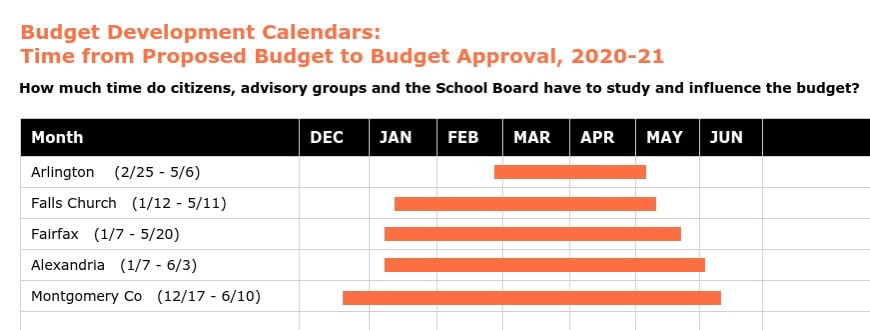|
Last week, I wrote that I am going through the end-of-year reports from various APS citizen advisory committees, beginning with the Budget Advisory Council. I'm sharing what I'm learning from these reports with you, along with some of my own questions and ideas. You can read the first part of my budget takeaways here. This week's budget email focuses on ways that we can improve community engagement during the budget process, plus one idea that might generate additional revenue for our schools. 1. We aren't getting the full benefit of the Budget Advisory Council's expertise. The Budget Advisory Council reports to the School Board and is charged with maintaining fiscal integrity, public confidence, and wise stewardship of taxpayer resources as outlined in school district policy. Although it reports to the School Board and not the Superintendent, the BAC could very likely play a more significant role during APS's budget development--and wants to. In its June 2020 end-of-year report, the BAC wrote: "Currently, the annual Superintendent’s Proposed Budget is prepared by, APS staff under strict secrecy and released to the School Board and the Arlington public on a planned date in late February. There is no statute, policy, or implementation procedure that dictates such secrecy." Because the BAC sees the budget at the same time it's presented to the School Board, it is "perennially concerned about its effectiveness as an advisor on budget issues and its value to the School Board." Additionally, The BAC notes in its 2021 end-of-year report that in the most recent budget cycle it had only about ten minutes to discuss its work with the School Board in an April budget work session—which doesn’t do justice to the extensive analysis it had prepared for the Board’s review and doesn’t incentivize talented and engaged citizens to donate their time to serve on the BAC. The BAC also wants to have more meaningful input into the Budget Direction that the School Board sets for APS staff each October. To that end, this year the BAC included its suggestions for the FY23 Budget Direction in its EOY report so that School Board members would have plenty of time to digest the recommendations and ask questions. 2. We can involve the community earlier and more meaningfully. Last November, the BAC offered to facilitate a meeting with representatives from many different citizen advisory committees to share ideas about developing the APS budget and finding cost savings. In its EOY report it notes, “Although there seemed to be some hesitancy about the cross-committee meeting and BAC playing a role in convening such a group, we would encourage the Board to repeat the idea gathering process next year and to formally end it with such a gathering, hosted by the BAC, for the benefit of all groups, so that all of the committees’ ideas can be shared and discussed openly.” The report continues: “While we believe larger changes will be needed, we urge the Superintendent not to spring these changes on the community for the first time in late February, but rather to tell the community that certain things are being considered, so that the community has time to weigh in and participate in the conversation, before large decisions are proposed and made.” To that end, we could adjust the budget development calendar so that the community has more time to study it and provide feedback. The calendar for FY23 budget development was approved by the School Board at its July 1 meeting, but let’s start talking about the next cycle. As I wrote back in March, many other local school systems provide more time for citizens to weigh in on the budget. A few examples: 3. We can change how the budget is presented so it’s more user-friendly and useful to the School Board and the community. Right now, there’s simply no good way for the public to read and understand the APS budget as it’s currently presented. People with the time and financial literacy skills needed to digest all the information are at a distinct advantage in advocating for programs and line items they care about--and that’s a real equity issue. Additionally, and as the BAC noted in its 2020 report, there's real inconsistency in how individual expenditures and proposed cuts are presented in the budget book. We should explore:
4. We should talk about setting up an education foundation. In its EOY report, the BAC suggests that we could increase financial support for APS by forging a strong partnership with Amazon and courting other corporate philanthropy. We should talk about whether this is something we want to pursue and study the examples of other communities across the country (and in Northern VA) who have done so by setting up education foundations. Education foundations are separate non-profit organizations that raise money for their local public school districts. There are more than 6,500 district education foundations serving 14,500 school districts across the US (National School Foundation Association). These organizations raise money from businesses, other foundations, and individuals and can help support more equitable spending and fundraising across an entire school division, when compared to fundraising that's done only at the individual school level by PTAs and other groups. In the DC metro area, Arlington and Alexandria are the only localities that don't have education foundations. Some examples to consider:
If you believe that Arlington could benefit from ideas like these or if you have ideas of your own to share, I invite you to get in touch with me, share and discuss this article with others, and become involved in the APS budget process. Comments are closed.
|
AuthorWrite something about yourself. No need to be fancy, just an overview. Archives
October 2021
Categories
All
|

 RSS Feed
RSS Feed